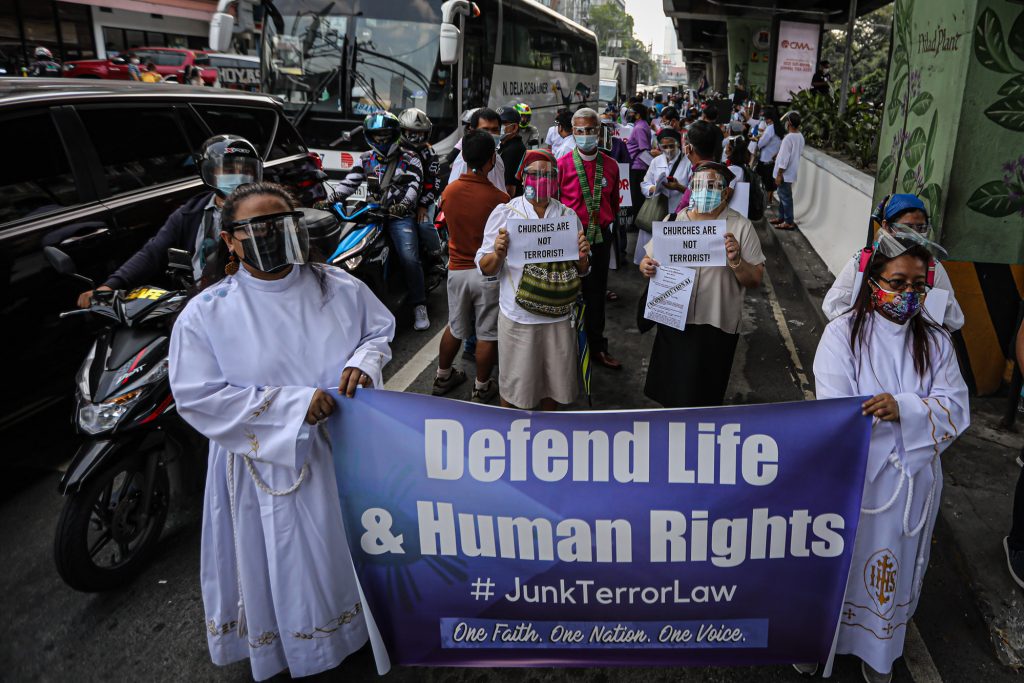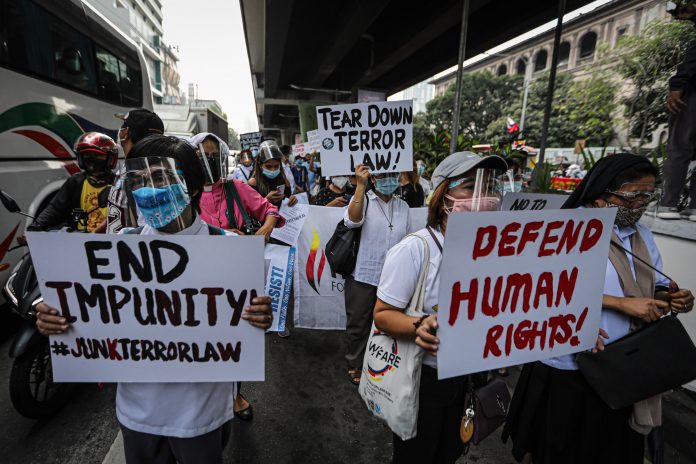Several Church groups in the Philippines have appealed to the Supreme Court this week to exercise “sound judgment” and junk the country’s anti-terrorism law.
“We firmly believe that the Anti-Terrorism Act of 2020 is a repressive law fashioned around an ambiguous definition of ‘terrorism,'” read a statement signed by the Church leaders.
The group that calls themselves “One Faith, One Nation, One Voice” warned that the anti-terrorism law will only be misused and abused by militarists who wish to “lord it over” the people.
The Supreme Court started to hear oral arguments on the anti-terrorism law on Tuesday, February 2, amid protest by human rights and activist groups.
The Church leaders said they are praying that “sound judgment founded on our nation’s values and Constitutional protections of democracy, civil liberties, and the respect for human life and rights will guide the court.”
“With concern for democracy and the protection of human life, we pray that the Supreme Court will be able to discern the dangers and pitfalls of this legislation,” read the group’s statement.
The group said the “perverse and rampant pursuit of red-tagging witch-hunts in recent months demonstrate clearly the pernicious character of unchecked labelling of persons.”
“Coupled with a severe weakening of protections of civil liberties under the Anti-Terrorism Law of 2020, democratic space, freedom of speech and association, and other human rights will be under threat,” added the group’s statement.
“As Church leaders, we will continue to speak out for the welfare of the people,” read the statement signed by Bishop Broderick Pabillo, apostolic administrator of Manila; Bishop Reuel Norman Marigza, general secretary of the National Council of Churches in the Philippines; and Brother Armin A. Luistro, FSC, provincial superior of the De La Salle Brothers in East Asia.
Rev. Rhee Timbang, Obispo Maximo of the Iglesia Filipina Independiente; Sister Ma. Lisa Ruedas, DC, head of the Justice, Peace and Integrity of Creation of the Daughters of Charity congregation; and Bishop Emergencio Padillo, head of the Middle Luzon Jurisdiction of the United Church of Christ in the Philippines, also signed the statement.
They said they oppose they oppose the Anti-Terrorism Act of 2020 for the following reasons:
- An overly broad and amorphous usage of the term terrorism, which will surely be utilized by state forces for attacks on dissent and curtailment of human rights and civil liberties.
- A weakening of the judicial system and the constitutionally enshrined function to check-and-balance the actions of other branches of government, including state forces under the administrative branch.
- Allowances for surveillance, wire-tapping, and invasion of privacy without any evidence of any alleged suspect’s wrongdoing.
- Arrests and holding of persons without warrants or charges, duly and speedily processed through the courts.
- A removal of financial penalties to be awarded to persons detained under false pretense, thus increasing the likelihood of gross impunity to be committed by state forces.

Heed voice of the people
Bishop Gerardo Alminaza of the Church People Workers Solidarity urged the justices of the Supreme Court to “heed the voice of the people, defend the truth, and junk the dreaded terror bill.”
“Let us join hands in prayer for our magistrates in the Supreme Court that God may enlighten their hearts and minds,” said the prelate of San Carlos in the central Philippines in a statement.
He said said perpetrators of killings, threats, intimidations and harassment are emboldened to continue their criminal acts because of the law.
“Recent incidents’ of red-tagging by government agents against Church and health workers in Negros resulted to killings,” noted Bishop Alminaza.
In a letter addressed to the Supreme Court, the National Clergy Discernment Group of Catholic priests and religious, appealed to the justices to declare the anti-terrorism law “unconstitutional.”
The group said terrorism and acts of terror do not exist as a national reality in the Philippines. They said if there are terrorists, these could only be confined in some small areas in Mindanao.
The Student Christian Movement of the Philippines, meanwhile, expressed support for the lawyers and petitioners contending the law before the Supreme Court.
“The Christian youth was angered to witness the state hurry the passing of the [anti-terrorism law],” read a statement signed by Kej Andres, national spokesman of the organization.
The first session for the oral arguments for the law started on February 2 in anticipation of the Supreme Court’s decision to either amend or restrict it.
The 37 petitions filed against the Anti-Terrorism Law make it the most challenged law in recent history.









